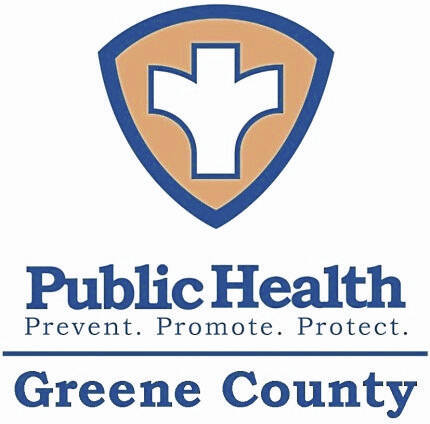
XENIA — Thanksgiving is just a few days away and the Greene County Public Health Environmental Health Services team wants you to have a healthy, foodborne illness-free meal.
Handling poultry incorrectly and undercooking it are the most common problems that lead to foodborne disease outbreaks.
Follow these tips to help you safely prepare your holiday turkey.
Thaw Your Turkey Safely
— In the refrigerator in a container.
— In a leak-proof plastic bag in a sink under a steady stream of cool running water 70 degrees or less, followed by placing into a refrigerator or cooking.
— In a microwave, following the manufacturer’s instructions.
Never thaw your turkey by leaving it out on the counter at room temperature or in a sink of water overnight. A thawing turkey must defrost at a safe temperature. When the turkey is at room temperature for more than two hours, it allows pathogens to grow. Bacteria can grow rapidly in the “danger zone” between 41-135 degrees.
Even when you think you are effectively cleaning by washing poultry, studies show that bacteria can easily spread to other surfaces and foods. The best practice is not to wash poultry, according to a release from GCPH.
What About Illness?
What if there was an illness with projectile vomiting and explosive diarrhea? In some situations (e.g., with children, the elderly, and individuals with compromised immune systems), these symptoms could become much more severe, causing severe dehydration, malnutrition, and even death. Norovirus is the leading cause of illness due to contaminated food outbreaks in the United States, according to the Centers for Disease Control and Prevention (CDC).
Norovirus is a common, highly contagious virus that can spread widely and rapidly. Every year, norovirus causes 19-21 million illnesses and hundreds of deaths, according to the CDC. Most of these outbreaks occur in food service settings — restaurants, schools, nursing homes, hospitals, day care centers, military barracks, universities, and cruise ships.
Preventing norovirus is a critical issue for the entire food service industry. Any company that makes, serves, or sells food in any capacity must be vigilant about this issue. It has been determined that the majority of foodborne outbreaks (64 percent) are attributed to restaurants. Of those outbreaks, 70 percent are caused by infected workers. Norovirus germs are spread quickly, easily, and can be projected onto surfaces and people within a 25-foot radius.
So even if your kitchen utensils, counters, and surfaces appear to be clean, it’s very possible that viruses and germs may be lingering on them. In fact, norovirus can live outside the body for several days, so it’s imperative to clean, sanitize, and disinfect surfaces thoroughly and often — especially during/after a norovirus incident or outbreak.
Food operations should keep the following in mind: Implement and train team members on standard operating procedures for preventing and reporting illness. This includes notifying the person in charge about any norovirus symptoms in staff members or guests. It also includes proper disposal of bodily fluids/vomit, sanitation of all surfaces, washing and sanitizing all linens, towels, and rags, as well as the disposal of any potentially contaminated food.
Avoid preparing food for others while you’re sick and for at least 48 hours after symptoms stop. Don’t allow employees to work if they’re exhibiting any exclusionary symptoms (vomiting, diarrhea, fever, jaundice). They must be symptom-free and may also require a medical release prior to returning to work, according to GCPH.
Ensure all employees wash their hands carefully and often with soap and hot water, dry with a paper towel, and wash again when returning to their workstation. Employees must be vigilant about washing their hands after using (or cleaning) the restrooms, after cleaning up bodily fluids (like vomit or feces), and after touching surfaces (including doorknobs) that have been touched by others, taking out the trash, etc.
Use proper equipment to clean up bodily fluids that could spread norovirus. For instance, Purell Body Fluid Spill kits are instrumental in containing and disposing of body fluids (vomit, diarrhea) that could spread norovirus. Wash and sanitize kitchen utensils, counters, and surfaces routinely, along with any food-contact surfaces/items.
Don’t forget about cleaning your appliances too (ovens, refrigerators, and ice machines). Wash table linens, napkins, dish rags, and other laundry thoroughly.
Be mindful of even the smallest areas. Clean and sanitize even the smallest spaces and hidden places, such as the gaps between counters and walls, in tile grout, etc. Ensure that every part of your facility — no matter how small — is cleaned and sanitized regularly to prevent germs from lingering.
Prohibit staff members from using their cell phones in the kitchen/food prep areas. Many employees take their cell phones into the bathroom and hold them while using the facilities and/or put them down on the dirty bathroom floor. By doing so, their phones can easily get contaminated with traces of feces, urine, or vomit, which can be spread to hands, gloves, foods, and surfaces. Make sure cell phones aren’t used around food to help prevent potential norovirus germs from being spread.
Train and educate your staff about food safety protocols and ensure they follow the strictest procedures whenever preparing, storing, and serving food. Educate them on how to prevent, report, and contain norovirus to keep your guests, staff, and business safer and healthier.
For more information, contact the Environmental Health Services team at 937-374-5607.

